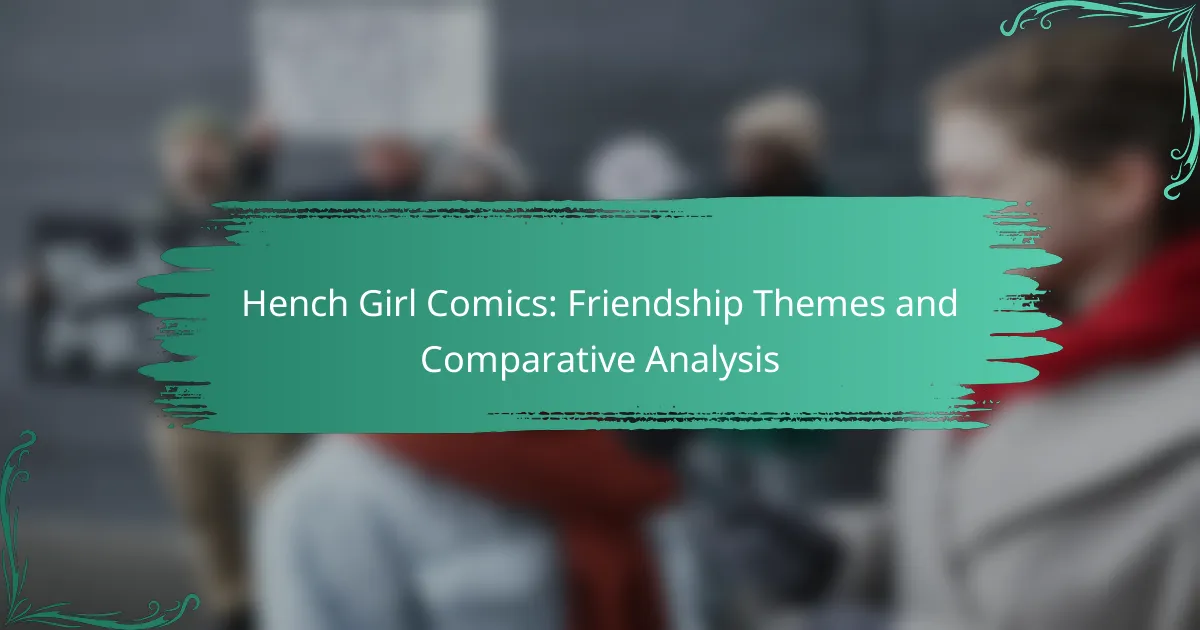Hench Girl Comics intricately explore themes of friendship, emphasizing how relationships shape character development and conflict resolution in a world dominated by supervillains and heroes. Through humor and relatable dynamics, these comics highlight essential lessons of trust, loyalty, and empathy, setting them apart from traditional superhero narratives. The unique focus on the bonds among henchwomen offers a fresh perspective on the complexities of friendship in challenging circumstances.
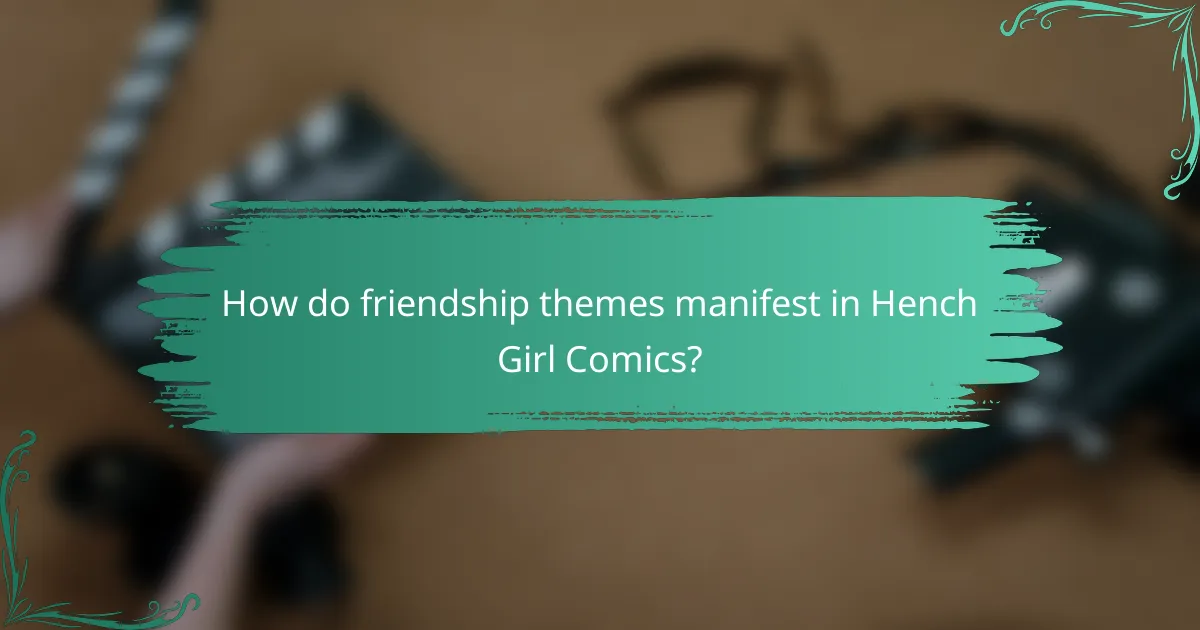
How do friendship themes manifest in Hench Girl Comics?
Friendship themes in Hench Girl Comics are central to character interactions and plot development, showcasing how bonds can influence personal growth and conflict resolution. These themes often highlight loyalty, support, and the complexities of relationships among characters, particularly in a world filled with supervillains and heroes.
Character dynamics and relationships
In Hench Girl Comics, character dynamics often revolve around the friendships formed between henchgirls and their supervillain bosses or fellow henchmen. These relationships can range from supportive and nurturing to competitive and strained, reflecting the multifaceted nature of friendship. For example, a henchgirl may struggle with loyalty to her boss while also forming a strong bond with another henchgirl, leading to tension and growth.
These dynamics are essential as they drive the narrative forward, influencing decisions and actions. The contrasting personalities of characters often create rich interactions, where friendship can either empower or hinder their goals.
Conflict resolution and support
Conflict resolution in Hench Girl Comics frequently hinges on the strength of friendships among characters. When faced with challenges, friends often come together to support one another, providing emotional and practical assistance. This support can manifest in various ways, such as strategizing for a heist or helping a friend overcome self-doubt.
Moreover, the resolution of conflicts often reinforces the bonds between characters, showcasing how overcoming obstacles together can deepen friendships. This theme emphasizes the importance of collaboration and understanding in navigating the complexities of their world.
Impact on character development
The friendship themes in Hench Girl Comics significantly impact character development, allowing characters to evolve through their relationships. As characters face trials and tribulations, their friendships often serve as catalysts for personal growth, pushing them to confront their fears and insecurities. For instance, a henchgirl may initially be portrayed as insecure but can gain confidence through the support of her friends.
Additionally, the evolution of friendships can lead to transformative experiences, where characters learn valuable lessons about trust, sacrifice, and the importance of standing by one another. This development not only enriches the narrative but also resonates with readers, making the characters more relatable and engaging.
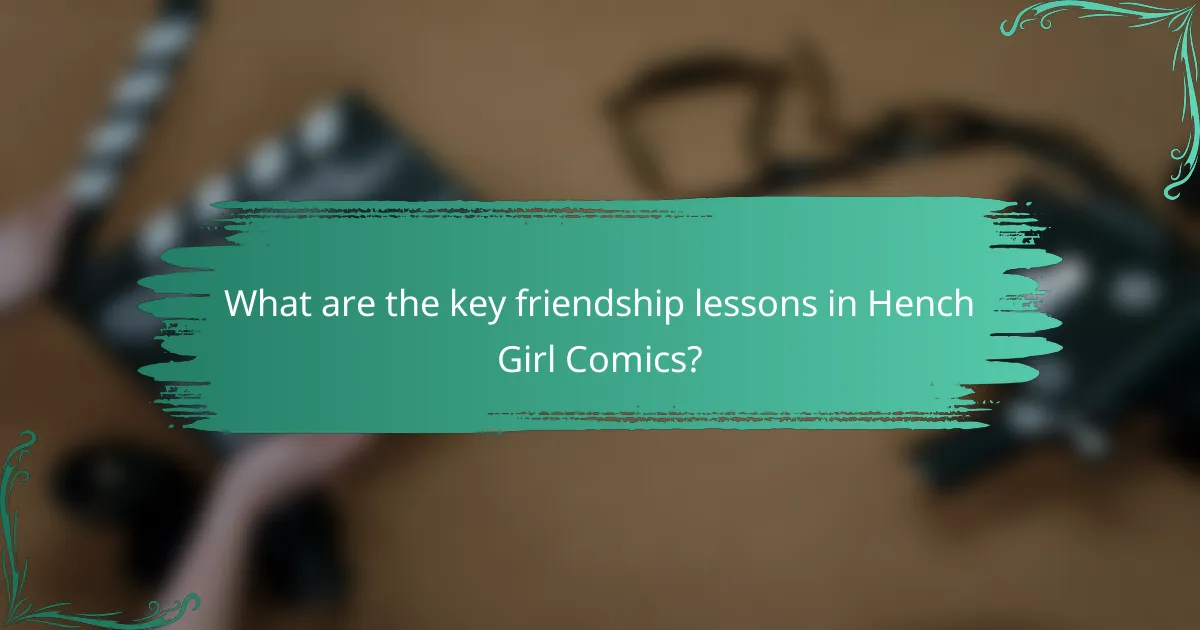
What are the key friendship lessons in Hench Girl Comics?
Hench Girl Comics illustrate essential friendship lessons, focusing on trust, loyalty, empathy, and understanding. These themes are woven throughout the narratives, showcasing how characters navigate their relationships in the context of their unique challenges.
Trust and loyalty
Trust and loyalty are foundational elements in the friendships depicted in Hench Girl Comics. Characters often face dilemmas that test their allegiance to one another, highlighting the importance of standing by friends during tough times. For instance, when a character makes a questionable decision, their friends must decide whether to support them or distance themselves.
Building trust involves consistent actions over time. Characters demonstrate loyalty by keeping promises and being reliable, which strengthens their bonds. Readers can learn that maintaining trust requires open communication and a willingness to forgive mistakes.
Empathy and understanding
Empathy and understanding are crucial for resolving conflicts and deepening friendships in Hench Girl Comics. Characters often find themselves in situations where they must consider their friends’ feelings and perspectives, leading to personal growth. For example, when one character experiences a setback, the others rally around to provide support and encouragement.
Practicing empathy involves active listening and validating feelings. Characters who show understanding foster a safe environment where everyone feels valued. This teaches readers that taking the time to understand a friend’s situation can significantly enhance the quality of their relationships.
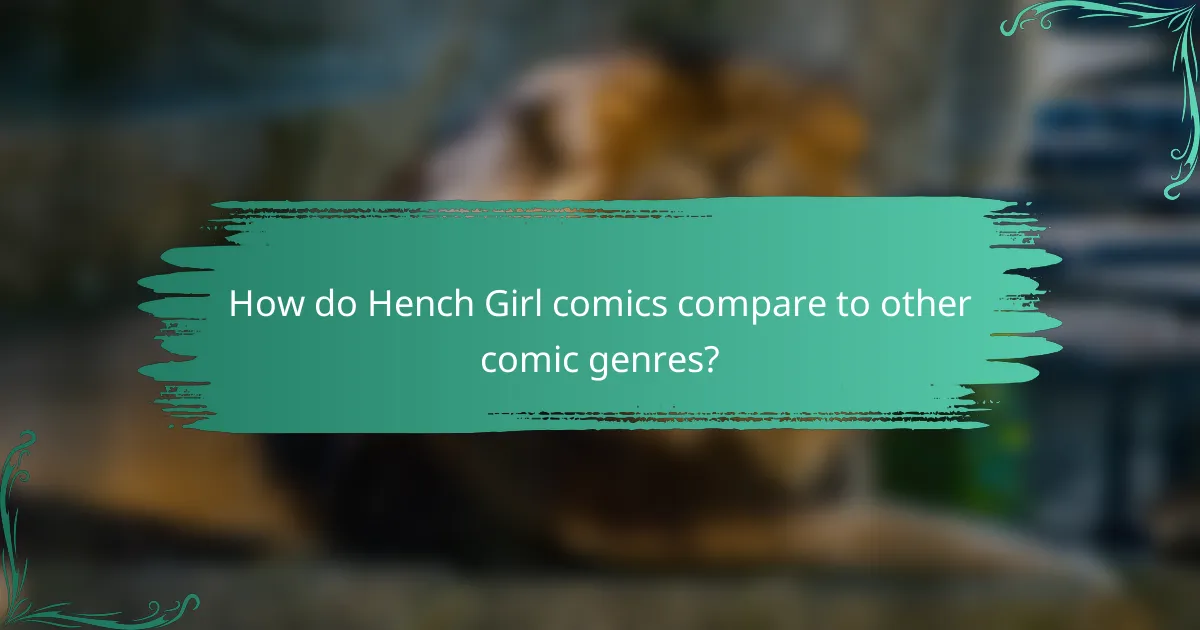
How do Hench Girl Comics compare to other comic genres?
Hench Girl comics stand out by blending elements of humor, friendship, and villainy, making them distinct from other comic genres. While they share themes with superhero and slice-of-life comics, their unique focus on the dynamics of friendship among henchwomen sets them apart.
Comparison with superhero comics
Hench Girl comics often parody superhero tropes, focusing on the lives of sidekicks and henchmen rather than the main heroes. This perspective allows for a humorous exploration of loyalty and ambition within villainous contexts, contrasting with the traditional hero-villain dichotomy found in superhero comics.
For example, while superhero comics typically emphasize individual heroism and moral dilemmas, Hench Girl comics highlight the camaraderie and struggles of characters who support villains. This shift in focus creates a fresh narrative that appeals to readers looking for humor and relatability in a fantastical setting.
Contrast with slice-of-life comics
Unlike slice-of-life comics that depict everyday experiences and personal growth, Hench Girl comics incorporate fantastical elements and exaggerated scenarios. While both genres explore relationships, Hench Girl comics do so within a framework of villainy and absurdity, often leading to comedic situations that slice-of-life comics may not address.
For instance, slice-of-life comics might focus on friendship dynamics in mundane settings, while Hench Girl comics introduce conflicts involving supervillain plans and quirky henchmen antics. This contrast allows Hench Girl comics to maintain a lighthearted tone while still addressing themes of friendship and loyalty in unconventional ways.
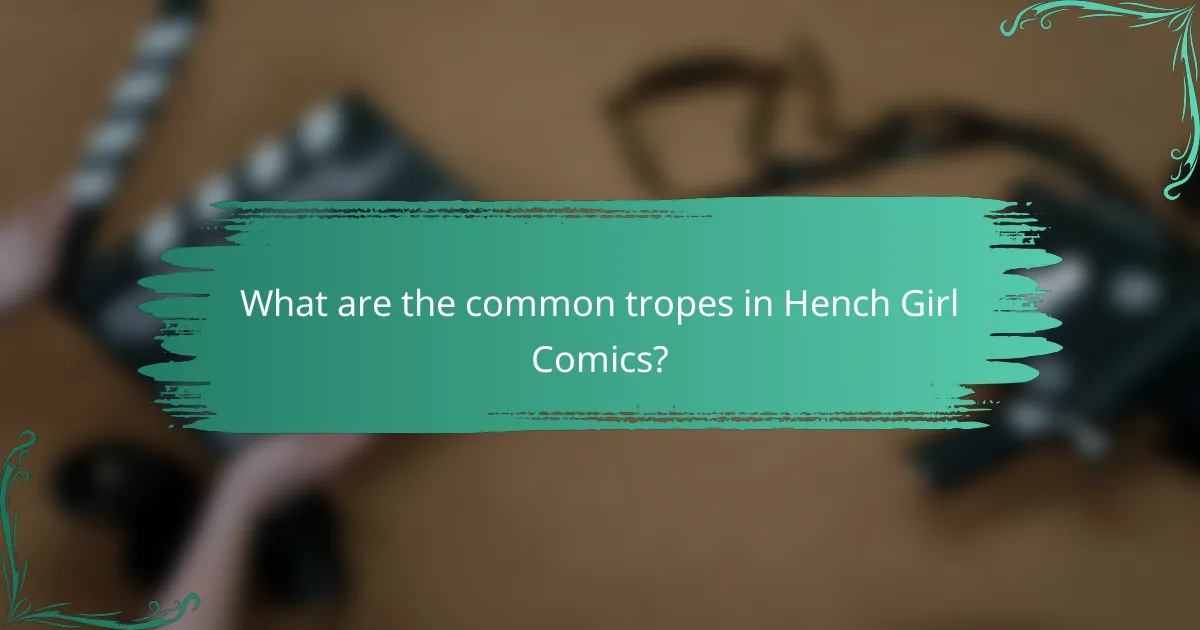
What are the common tropes in Hench Girl Comics?
Hench girl comics often feature recurring themes that explore the dynamics of friendship, loyalty, and identity. Common tropes include sidekick archetypes and mentorship roles, which shape the characters’ development and interactions throughout the narrative.
Sidekick archetypes
In hench girl comics, sidekick archetypes typically embody characteristics such as loyalty, humor, and a desire for validation. These characters often serve as the protagonist’s confidant, providing comic relief and emotional support while navigating their own challenges.
Examples of sidekick archetypes include the eager apprentice, who is enthusiastic but inexperienced, and the reluctant partner, who may question their villainous path. These dynamics create tension and depth, allowing for character growth and exploration of moral dilemmas.
Mentorship roles
Mentorship roles in hench girl comics often highlight the relationship between a seasoned villain and their young hench girl. This dynamic can showcase themes of empowerment, as the mentor guides the sidekick through the complexities of villainy while imparting wisdom and skills.
These mentorships can take various forms, from supportive and nurturing to manipulative and controlling. The mentor’s influence can significantly impact the hench girl’s choices, leading to pivotal moments where she must decide between loyalty to her mentor and her own moral compass.
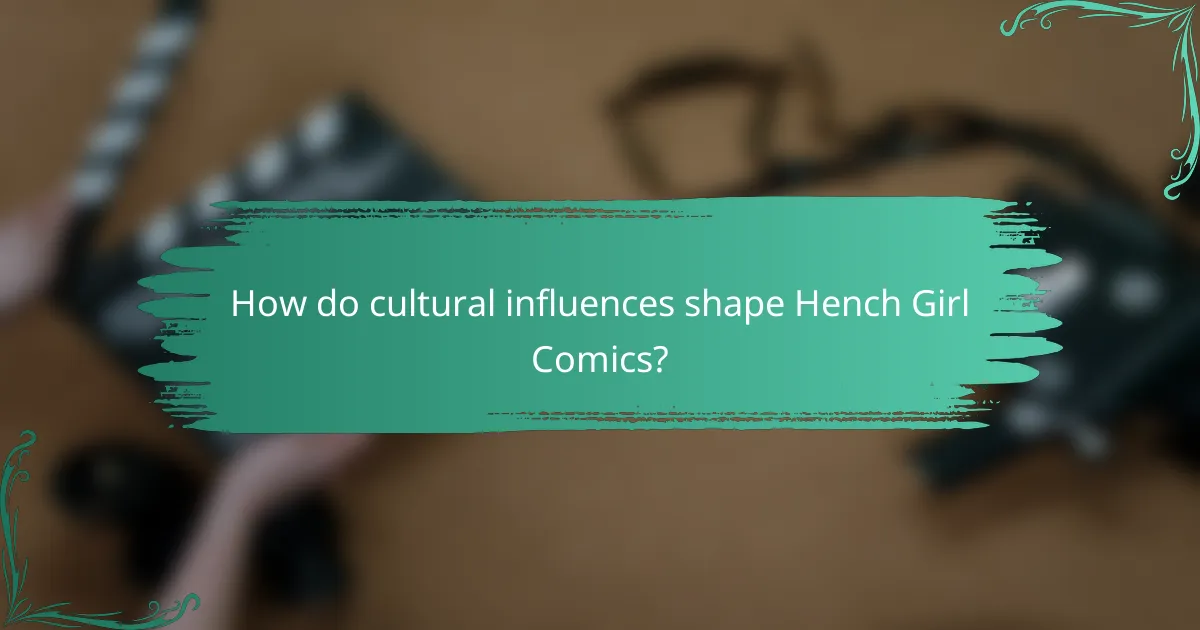
How do cultural influences shape Hench Girl Comics?
Cultural influences significantly shape Hench Girl Comics by informing character development, storylines, and themes. These comics reflect societal values, norms, and challenges, often highlighting the complexities of friendship within diverse contexts.
Representation of diverse backgrounds
Hench Girl Comics often feature characters from various cultural and ethnic backgrounds, promoting inclusivity and representation. This diversity allows for richer narratives that resonate with a broader audience, showcasing different perspectives on friendship and loyalty.
For example, a comic might depict a hench girl from a marginalized community navigating her role in a villain’s world while maintaining her cultural identity. Such representations can foster empathy and understanding among readers, encouraging them to appreciate different experiences.
Influence of pop culture
Pop culture plays a crucial role in shaping the themes and aesthetics of Hench Girl Comics. References to popular movies, music, and social media trends can enhance relatability and engagement, making the stories more appealing to contemporary audiences.
For instance, a hench girl character might embody traits from a popular film or series, using humor and wit to navigate her challenges. This connection to pop culture not only entertains but also reflects current societal dynamics, influencing how friendship is portrayed in these narratives.
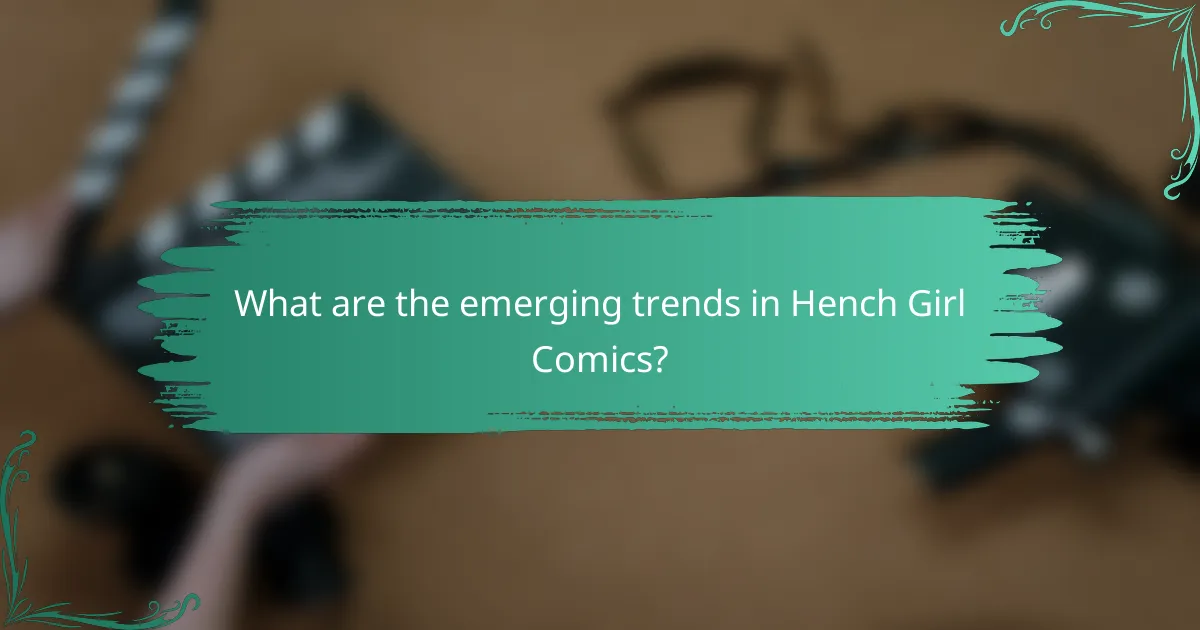
What are the emerging trends in Hench Girl Comics?
Emerging trends in Hench Girl Comics highlight a shift towards narratives that emphasize female empowerment and the use of digital storytelling techniques. These trends reflect broader societal changes and the evolving landscape of comic book publishing.
Increased focus on female empowerment
The focus on female empowerment in Hench Girl Comics showcases strong, complex female characters who defy traditional roles. These stories often explore themes of friendship, loyalty, and personal growth, allowing readers to connect with the characters on a deeper level.
Examples include narratives where female sidekicks take center stage, demonstrating their strength and independence. This shift encourages a more diverse representation of women in comics, appealing to a wider audience and fostering discussions around gender equality.
Integration of digital storytelling
Digital storytelling is becoming increasingly prevalent in Hench Girl Comics, allowing creators to experiment with interactive formats and multimedia elements. This approach enhances reader engagement by incorporating animations, sound effects, and hyperlinks, creating a more immersive experience.
Platforms like Webtoon and Tapas have popularized this trend, enabling creators to reach global audiences while providing a space for innovative storytelling. As digital formats continue to evolve, they offer new opportunities for character development and plot exploration, making Hench Girl Comics more dynamic and accessible.
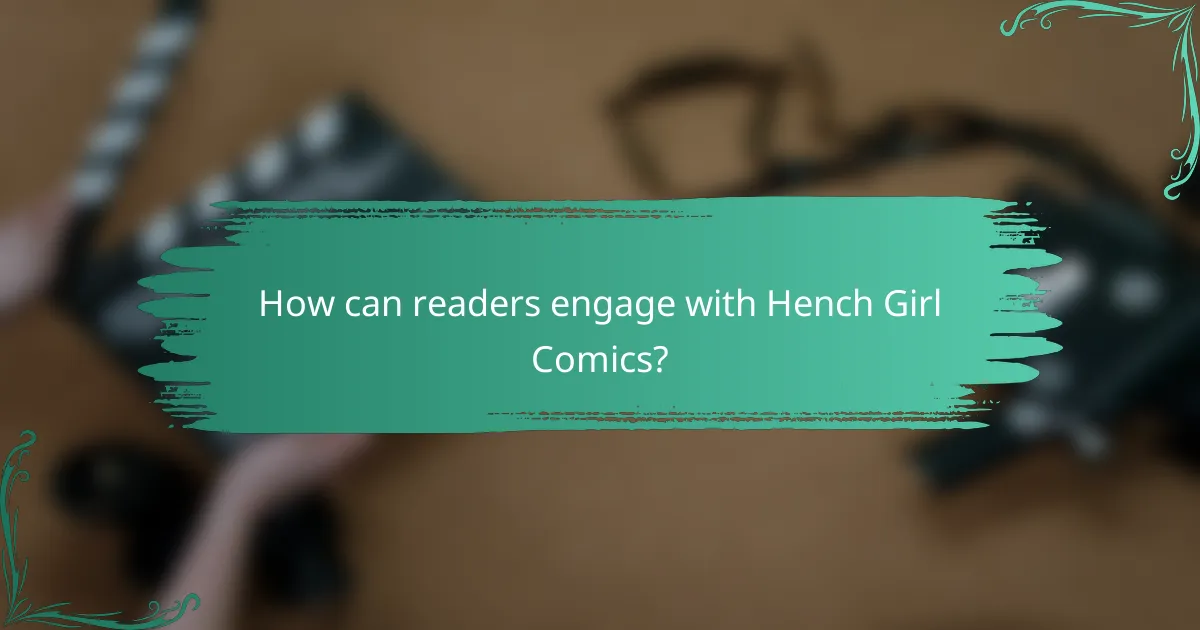
How can readers engage with Hench Girl Comics?
Readers can engage with Hench Girl Comics by exploring its themes of friendship and character dynamics through various platforms, including comic book stores, online retailers, and digital comic apps. Participating in discussions on social media or fan forums can also enhance the experience.
Exploring Themes of Friendship
Themes of friendship in Hench Girl Comics are central to the narrative, showcasing the bonds formed between characters in the context of their unique challenges. These relationships often highlight loyalty, support, and the complexities of trust, making them relatable to readers.
For example, the protagonist’s interactions with her fellow henchmen illustrate how camaraderie can develop in unconventional settings. Readers can reflect on how these friendships mirror their own experiences, enhancing emotional investment in the story.
Comparative Analysis with Other Comics
When comparing Hench Girl Comics to other titles, it’s essential to consider how friendship is portrayed across different genres. While superhero comics often emphasize individualism, Hench Girl Comics focuses on teamwork and collaboration among characters.
For instance, in contrast to traditional superhero narratives where the hero often works alone, Hench Girl Comics emphasizes the importance of community and shared goals. This approach can resonate with readers looking for stories that celebrate collective strength.
Engagement Through Community
Engaging with the Hench Girl Comics community can enhance the reading experience. Fans can join online forums, participate in social media discussions, or attend comic conventions to connect with others who share their interests.
Additionally, creating fan art or writing fan fiction can be a fun way to express appreciation for the series. These activities not only deepen understanding of the themes but also foster a sense of belonging within the fandom.
